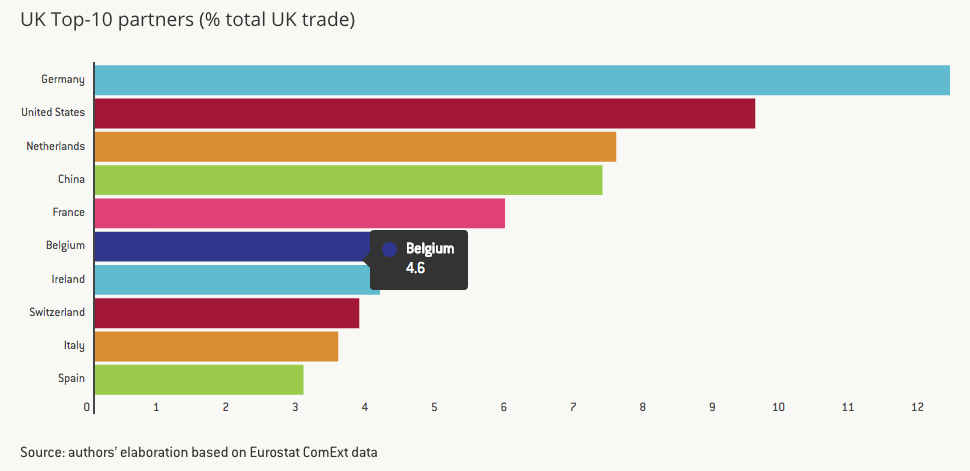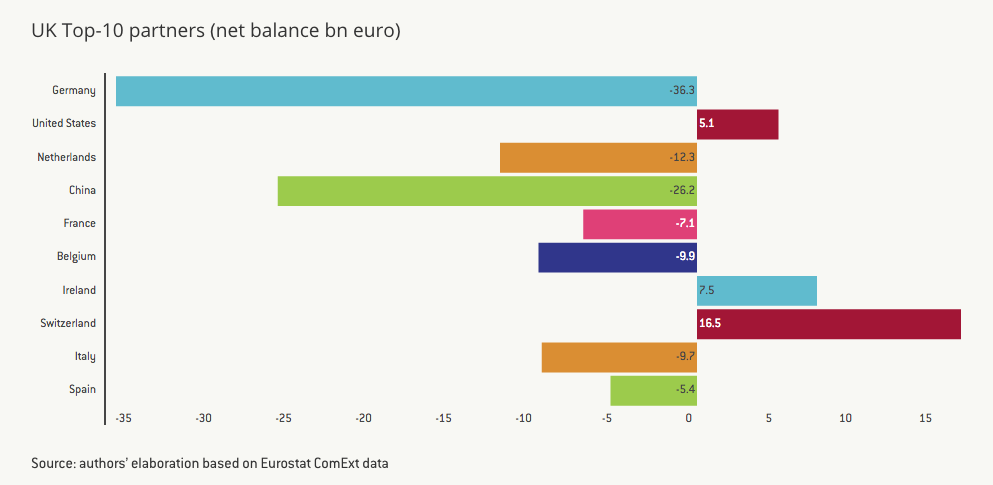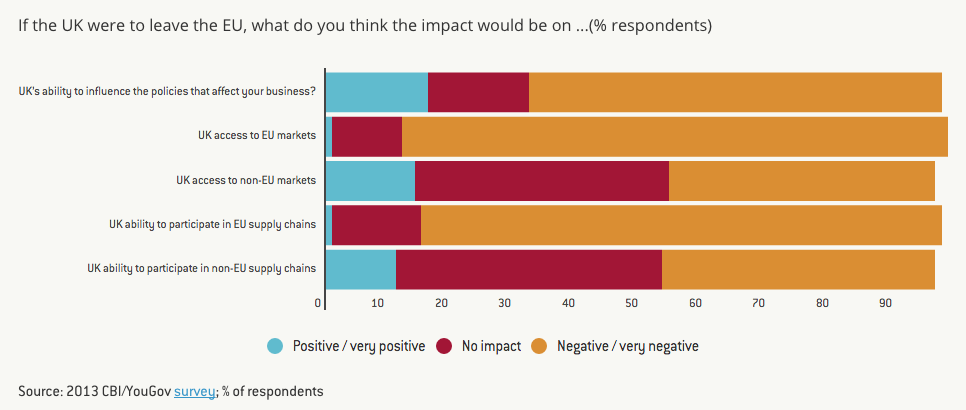
 Who does the UK trade with, how much would tariffs be affected by leaving the EU, and how many agreements would have to be renegotiated? In an article that first appeared at Bruegel, Pia Hüttl (left) and Silvia Merler review the UK’s trade position and conclude that if a Brexit occurs, the UK would need to renegotiate more than 100 trade agreements.
Who does the UK trade with, how much would tariffs be affected by leaving the EU, and how many agreements would have to be renegotiated? In an article that first appeared at Bruegel, Pia Hüttl (left) and Silvia Merler review the UK’s trade position and conclude that if a Brexit occurs, the UK would need to renegotiate more than 100 trade agreements.
In 2014, total UK trade was about 900 bn euros, with a total trade deficit of 139.5 bn. The UK imported predominantly from the EU, with which it had a trade deficit of 93 bn euro, and exported mostly to non-EU countries, with which it also had a trade deficit of 46bn. EU countries accounted for 53% of UK imports and 48% of UK exports.
All but 2 of the top-10 trading partners of the UK belong to the European Union. The UK’s main trading partner in 2014 was Germany, which accounted for 12.3% of all UK trade in that year. In second position was the United States (9.5%), followed by the Netherlands (7.5%), China (7.3%) and France (5.9%). Together, these 10 countries accounted for 61.4% of UK trade in 2014.
The UK was a net importer from 7 of its 10 main trading partners. The biggest bilateral imbalance in 2014 was the 36.3 bn euro trade deficit recorded with Germany, followed by the 26.2 bn trade deficit with China and the 12.3 bn deficit with the Netherlands. The biggest surplus position (16.5 bn) was recorded with Switzerland, followed by a 7.5bn surplus with Ireland and a 5.1bn surplus with the US.
Trade policy for EU Member States is conducted exclusively at the EU level. In case of Brexit, all the EU trade agreements of which the UK is automatically part as an EU member state would need to be re-negotiated on a bilateral basis.
Figure 3 shows the total value of UK trade broken down according to the different types of trade agreements in place with each partner. Only 15% of UK total trade is currently with countries that are not members of the EU and are not covered by any EU trade agreements. 51% of UK trade is with members of the European Union, 4% is with countries in the European Economic Area (EEA), 9% is covered by existing EU Preferential Trade Agreements (PTAs) and 21% is with countries with whom an EU PTA is currently under negotiation or exists, but it is not yet implemented.
The EU currently has existing PTAs with 52 countries, and it is negotiating trade agreements with another 72 countries. In case of Brexit, the UK would therefore need to re-negotiate or start new bilateral negotiations on 124 trade agreements, plus one additional trade agreement re-defining its own trade status as a third country vis-à-vis the EU.
If we limit the focus to the top-50 trade partners of the UK, who account for 92% of all UK trade, 41 of them do have some trade agreements or ongoing negotiations with the EU. 18 of the UK’s top 50 trade partners are EU countries, one (Norway) is an EEA country, one (Turkey) has a customs union agreement with the EU, eight countries have existing EU PTAs in place and 13 countries are currently negotiating EU trade agreements. This would translate into a minimum of 24 negotiations to be concluded.

Renegotiating these agreements would take time: as an example, negotiations on the EU’s trade agreement with Canada started in 2009 and were only concluded with the legal review of the texts in February 2016. Meanwhile, the UK would also be excluded from the currently ongoing EU negotiations with the US, Japan and China, which would also need to be restarted on a bilateral basis. While Brexit supporters might argue that the UK would have more flexibility when negotiating alone, it is also likely that its bargaining power would be considerably reduced compared to that of the EU, which is one of the top three traders in the world.
Negotiating a trade agreement between the UK and the EU might also take considerable time: the French economy minister has for example said recently that in the case of Brexit “collective energy would be spent on unwinding existing links, not re-creating new ones”. During the time of negotiations the UK’s exports would probably be subject to the EU’s current Most-Favoured Nation (MFN) tariffs.
Based on data from the WTO Tariffs Database, we find that the average (weighted by 2014 exports) MFN tariff on UK exports to the EU-28 would be about 3.2%. If we were to apply an average tariff of 3.2% to the total 2014 intra-EU exports – which amounted to 182 bn euro – the average tariff cost would be about 5.84bn euro.
This is obviously a simplistic exercise, aimed at giving a rough idea of the cost associated with losing the current regime which the UK enjoys on intra-EU exports as a member of the EU. It should be kept in mind that the cost would be unevenly distributed across sectors. For example, the sector that accounts for the UK’s largest trade surplus with the EU (mineral fuels and related products) faces an average tariff of only 0.8%. Meanwhile, fish exports, which contributed a trade surplus of 517m euro in 2014, would face an average tariff of 11%.
These few data should suffice to show that the outcome of a Brexit on the UK’s trade performance would be uncertain and likely not very rosy. Businesses in the UK seem to realise this, as is shown by a survey conducted jointly in 2013 by YouGov and the Confederation of British Industry (Figure 4). 65 percent of respondents argued that if the UK were to leave the EU, this would have a negative or very negative impact on the UK’s ability to influence the policies affecting their businesses. 86 percent said Brexit would have a negative or very negative impact on the UK’s access to EU markets and 82 percent said it would negatively affect the UK’s ability to participate in EU supply chains. Importantly, 42-43% of respondents said that Brexit would also negatively affect the UK’s access to non-EU markets and non-EU supply chains.
An apocryphal British newspaper headline allegedly once proclaimed “Fog in the Channel. Continent cut off.” This sentiment has since become a symbol of the UK’s perception of its relationship with Europe: that the UK can function very well alone and it is instead the “continental Europeans” who most need the British. However, in terms of international trade, it seems that the UK would struggle to act in splendid isolation. The consequences of a Brexit in this domain could be unpleasant, and re-establishing the UK’s trade agreements and networks would be a long a complex process.
This post, which originally appeared at Bruegel, represents the views of the authors and not those of BrexitVote, nor the LSE.
Pia Hüttl is an affiliate fellow at Bruegel. Prior to this, she worked as a Trainee in the Monetary Policy Stance Division of the European Central Bank, and as a Blue Book Stagiaire at the monetary policy, exchange rate policy of the euro area, ERM II and euro adoption Unit of DG ECFIN.
Silvia Merler is an affiliate fellow at Bruegel. Her main research interests include international macro and financial economics, central banking and EU institutions and policy making. Before joining Bruegel, she worked as an economic analyst in DG Economic and Financial Affairs of the European Commission (ECFIN).










“Brexit” will mean starting a new trade group without all of the horrendous mistakes of the EU.
That does not mean anything other than effort & three years of work.
There is no need to attempt to bustle around the globe trying to sign up for 100 separate trade agreements – but then the authors of this silly article know this full well.
Propaganda is not what it used to be.
Lies.
Saying that the EU made mistake is just a lie.
And implying that westminister would do a better job without numbers, well, is racist.
It seems the trade deficit is so bad with the e/u the billions we save more than covers any &all jobs lost,with billions surplus.